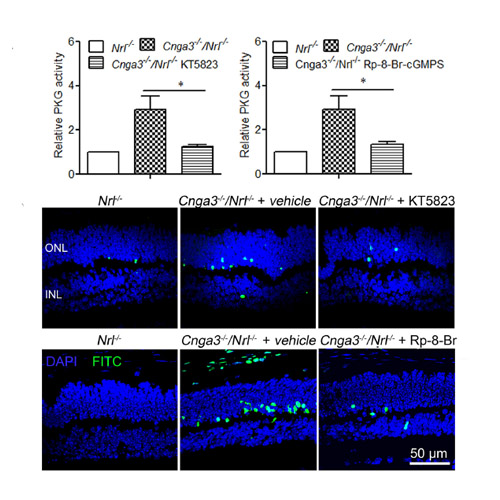cGMP/PKG Signaling Suppresses Inositol 1,4,5-Trisphosphate Receptor Phosphorylation and Promotes Endoplasmic Reticulum Stress in Photoreceptors of CNG Channel-Deficient Mice
29-May-2015
THE JOURNAL OF BIOLOGICAL CHEMISTRY, VOL. 290, NO. 34, pp. 20880–20892, doi:10.1074/jbc.M115.641159
Photoreceptor cyclic nucleotide-gated (CNG) channels play a pivotal role in phototransduction. Mutations in the cone CNG channel subunits CNGA3 and CNGB3 are associated with achromatopsia and cone dystrophies. We have shown endoplasmic reticulum (ER) stress-associated apoptotic cone death and increased phosphorylation of the ER Ca2+ channel inositol 1,4,5-trisphosphate receptor 1 (IP3R1) in CNG channel-deficient mice. We also presented a remarkable elevation of cyclic guanosine monophosphate (cGMP) and an increased activity of the cGMP-dependent protein kinase (protein kinase G, PKG) in CNG channel deficiency. The current work investigated whether cGMP/PKG signaling regulates ER stress and IP3R1 phosphorylation in CNG channel-deficient cones. Treatment with PKG inhibitor and deletion of guanylate cyclase-1 (GC1), the enzyme producing cGMP in cones, were used to suppress cGMP/PKG signaling in cone-dominant Cnga3-/-/Nrl-/- mice. We found that treatment with PKG inhibitor or deletion of GC1 effectively reduced apoptotic cone death, increased expression levels of cone proteins, and decreased activation of Muller glial cells. Furthermore, we observed significantly increased phosphorylation of IP3R1 and reduced ER stress. Our findings demonstrate a role of cGMP/PKG signaling in ER stress and ER Ca2+ channel regulation, and provide insights into the mechanism of cone degeneration in CNG channel deficiency.











